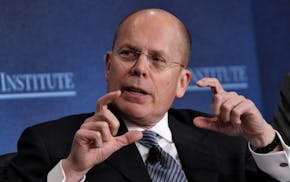Target convened the inaugural Twin Cities Asian Executive Leadership Conference this week and has plans to support its Asian American workers through a host of activities for Asian American and Pacific Islander Heritage Month in May.
On Friday, Target plans to start spotlighting Asian founders and product creators through a digital icon on the website.
The virtual conference and plans to more intentionally commemorate Asian American and Pacific Islander Heritage Month come at a time when anti-Asian hate crimes have continued to climb in the United States during the coronavirus pandemic.
To Don Liu, Target's chief legal and risk officer, Asian Americans can sometimes suffer professionally because of a "model minority" myth that Asian professionals are already successful and have no issues climbing the corporate ladder.
"That's just not an accurate picture of the larger reality," said Liu, whose family emigrated from Korea to the United States.
"A lot of Asian Americans face the challenges of moving up in the world," he said. "You will see very few Asian Americans at the higher ranks of corporate America across the board."
Since many companies can overlook Asian Americans in their diversity and inclusion efforts, some Asian professionals don't end up connecting with professional development and training that would help them in their careers, Liu said.
The Twin Cities Asian Executive Leadership Conference, which was more than a year in the making, was a step led by Target's Asian Business Council of employees to offer development opportunities for Asian Target employees as well as professionals throughout the area.
The conference, held virtually on Wednesday for more than 1,000 attendees, was geared toward Asian professionals who aspire to work in leadership positions. Brian Cornell of Target, Corie Barry of Best Buy, Mike Roman of 3M and Geoff Martha of Medtronic participated in a CEO panel discussion.
Cornell said companies and their leaders are tasked with speaking out more on societal issues such as the rising violence against Asian Americans.
"The expectations are higher than ever," he said. "It is part of that trust factor, people looking to CEOs and their company for advice, for clarity, for education and for action to make changes. So our voices have to be heard."
While the conference had been planned for some time, the event's timeliness increased as reports of anti-Asian attacks continued, including the March mass shootings at spa and massage parlors in the Atlanta area that left six Asian American women and two others dead.
"Certainly as the pandemic came and the rhetoric around the pandemic, the attacks and violence that we saw against Asian Americans or Asians across the globe, it was really even a more pronounced sentiment to 'OK how do we accelerate? How do we bring this together? How do we create this experience for leaders across the Twin Cities?' " said Kiera Fernandez, Target's chief diversity and inclusion officer and senior vice president of talent and change.
In March, Target announced it would donate to the Asian American Justice Center. The Target Foundation also pledged to invest $250,000 to organizations led by Asian Americans "working to empower the Asian American community, addressing gender-based violence and xenophobia, and advancing justice."
The Twin Cities Asian Executive Leadership Conference raised an additional $170,000 from corporate sponsorships that will go to Leadership Education for Asian Pacifics and the Asian American Business Development Center.
Out of its total workforce of around 360,000, 5% of Target workers identify as Asian. Among officers and the leadership team Asian representation is higher at 10% and 8%, respectively, according to the company's latest workforce diversity report with employee data from fiscal year 2019.
Still there are stereotypes or assumptions pushed upon Asian professionals that could hurt their career growth, for example, they should not ruffle feathers or be vocal about their aspirations and instead keep their heads down at work. Target is trying to correct those assumptions, Fernandez said.
Throughout the month of May, Target will offer employees a variety of career-building experiences including guest speaker discussions.
Publicly, Target has begun to highlight products online from Asian-owned companies such as dental night guard company OTIS Dental and coconut chip creator Dang Foods with an icon similar to what Target has recently done for Black brands.
Liu said the plan is for the work and conference to continue into the future. In the past several weeks, Liu helped start the Alliance for Asian American Justice, a collaboration between law firms and attorneys across the country to provide pro bono legal services to those who feel they have been the victims of anti-Asian hate crimes.
Target plans to host the conference regularly, Liu said.
"We need to continually remind our audience the challenges that Asian Americans face and ways in which to address that," he said.

UnitedHealth shareholders give tepid support to $60M in stock-based pay for new CEO
Target recalls more employee groups to downtown Minneapolis headquarters

Ronzoni pasta-maker coming to Lakeville in $880 million Post acquisition

$200M acquisition by Minneapolis company will help it aid other firms make deals

